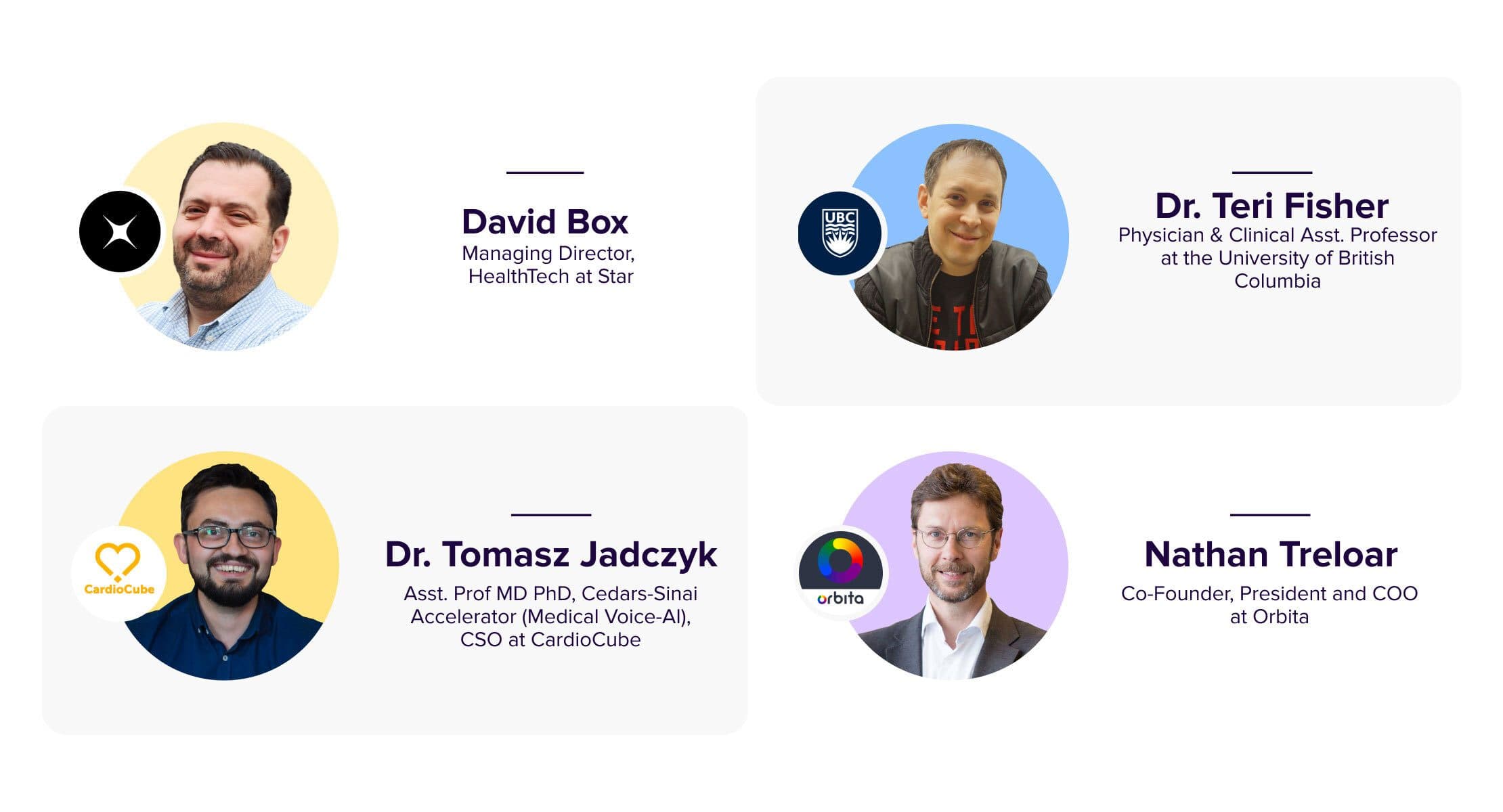
In our smartphone-centered era, where so much has come to revolve around text, it's easy to forget how impactful our voices are. But by offering convenience, meaningful interactions and reduced friction, along with myriad other benefits, voice technology is transforming healthcare. We brought together four leaders with expertise in creating and launching voice-fueled healthtech solutions.
Join them in this insightful conversation that examines the scaling role of voice in healthcare, the challenges it faces in achieving widespread adoption and the opportunities for driving real stakeholder engagement you can start harnessing now.
Giving a voice to everybody in healthcare
The healthcare system is complex, costly and under the immense strain of an aging population, shrinking workforce and ongoing population health challenges.
For those who aren't technologists or healthcare professionals, it can be easy to miss the vast transformative potential of voice in healthcare. That's why we naturally compare voice technology to products we’re familiar with like Alexa and Siri. While, ironically, many of these solutions are powered by Alexa or use Alexa as a conduit, it is indeed a certain simplicity and convenience that make them so impactful in healthcare.
Though he was speaking from his experience as a physician in Canada, Teri described the global importance of integrating voice technology throughout healthcare well by explaining, "There's so much pressure on the healthcare system and anything that relieves that pressure has got a tremendous benefit to society and to the healthcare system as a whole."
Here are just a few of the key points the podcast guests shared that explore what voice offers:
- Voice is user-centric: we've been trained over the past 30 years to grow more comfortable with the graphical user interfaces. Especially now, with the ubiquity of smartphones, it's easy to think of this as the default. But immense friction remains because humans and machines speak different languages and navigate these interfaces to translate user requests into actions. Voice interaction removes this barrier, creating convenience where it matters most.
- Voice takes care of mundane tasks, and that's a good thing: healthcare workers are under immense strain. There is simply not enough time in the day. Nurses spend just 37% of their time with patients. The rest is spent on time-consuming administrative work and repetitive tasks like fetching things and medication management. Nathan described how "we're starting to see voice devices being used in hospitals, at the bedside even where patients can communicate a need to an on-call nurse, to a smart speaker, a voice device, and beyond the red call button, which was basically on or off." It's a win-win that saves time for nurses while helping patients receive better care.
- Winning at the Digital Front Door: this leads to one of the most important takeaways from the podcast for businesses. David described how voice isn't just patient-centric, "I see a huge potential for voice from the perspective of the Digital Front Door. Just taking that into account from appointment setting to insurance verification and validation, there are many different aspects of patient onboarding that can be accomplished with voice setting appointments, leveraging bots and other products." Ultimately, it helps patients more easily get into the system, and providers maximize their time more efficiently.
- V-O-I-C-E: Teri gave the most memorable summation of voice technology's impact on healthcare using the word as an acronym. V - versatileO - omnipresentI - innateC - contextualE - efficient
If healthcare companies can create solutions that embody these five core principles, they'll be able to leverage voice to its fullest potential.
Subscribe on Apple Podcast | Subscribe on Spotify
What stands in the way of widespread voice adoption?
If voice is so great, you might be wondering why it isn't universal already. David described the biggest stumbling blocks for voice are "regulatory and compliance" issues and that "speaking information about a patient's condition, for example, and you're in a public setting, poses a challenge."
Likewise, there is not enough trust in the technology. Strangely, however, Teri described how this isn't coming from the patients but providers "We are missing people who will be brave enough to really inject this technology into the healthcare space."
Tomasz further illustrated this dissonance between the patients and providers by describing recent studies he and researchers at Cedar-Sinai Hospital have conducted. "Interestingly, elderly patients are okay with voice because it's so natural to use, and the entry bar for using voice technology is relatively low, so it's more applicable.
It's not what you say, but how you say it
All four podcast guests were optimistic about voice technology's ability to navigate these challenges and achieve scale. First and foremost, David noted that many of the above challenges should be overcome through "multimodal approaches in healthcare that offer voice, text, web, mobile as well as other means of engagement as opposed to voice only." Voice thus must be a part of a comprehensive and holistic user engagement strategy.
Signaling the importance of voice and other new technologies, including artificial intelligence, Nathan showed how automated bots have saved an immense amount of time for healthcare workers during the global COVID vaccination process while boosting engagement rates. Call centers have "about a 30% engagement rate, which means that 70% of the people have signed up for the vaccine aren't being reached to confirm that they're coming in for their appointment...with these automated bots, we're seeing engagement rates of up to 80%."
But this is just the beginning of what voice offers. We don't have to look far into the future to get a sense of what it can really do. Teri described how when we speak. There's much more to it than just what we say. Using the example of asking his son how his day at school was, the sentence "it was great" changes so much only with a tone shift.
Going further, he explained how "Computers can also detect that. And so what that means is you can start to extrapolate, and you can start to detect mental health issues, depression, anxiety and other conditions."
These are called voice biomarkers, and while they sound like something from science fiction, they are here and now. Nathan described a research study that proved the ability to extract a person’s heart rate from 10 seconds of spoken audio. This is just the beginning of what voice-enabled healthtech innovations will be able to learn and understand only from the sound of our voices.
The power and potential of voice in healthcare
We've only scratched the surface of what these digital health experts shared about the impact of voice technology in healthcare. Beyond these insights, they also explored:
- Further use cases throughout the ecosystem
- The role of ambient listening for enabling aging in place
- Forming emotional connections with voice assistants
- How healthcare companies can address concerns over data privacy and regulation.
They shed light on several more surprising facts, including that some patients are actually more honest with voice assistants than human physicians. As a final thought, Nathan reminded listeners that this technology isn’t some distant dream but is ready for use now, "the power and potential of voice technology and what can be done with it is ahead of how it's being applied right now."
Capture these insights and learn how to start embracing voice-powered health solutions.





